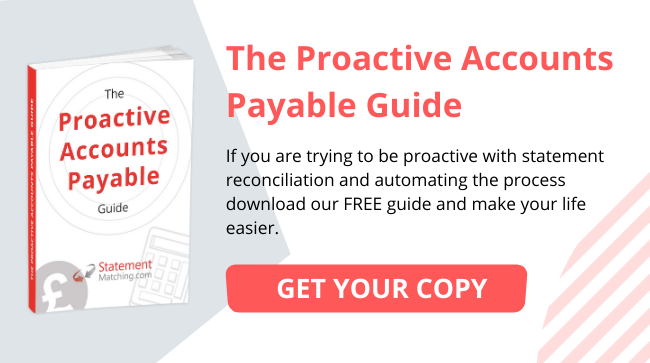43% of organisations would reconcile all their supplier accounts if they had unlimited time, while 16% would focus on their top 100 suppliers and 15% would prefer to concentrate on the top 20. This is a key finding of research (see Note 1 below) commissioned by Statement-Matching.com and undertaken by APN and indicates that statement reconciliation has significant business value.
However, in reality, although 62% of respondents undertake the activity on a monthly basis, 25% only do so on an ad hoc basis, and 2% never reconcile their supplier accounts. Only 12% reconcile all their accounts each month, while 13% are not able to reconcile any over that timescale.
The study revealed that the top reasons for statement reconciliation are:
Other motives include identifying miss-postings, meeting internal and external audit compliance rules, improving the service to suppliers and reducing the number of supplier queries.
42% of respondents report that the number of supplier queries is high or very high, with 82% saying they spend up to 30% of their time dealing with queries relating to invoice status.
The majority of supplier interaction is via email, with 28% of respondents saying they received up to 75% of queries this way. However, 35% reported that phone calls accounted for up to 50% of communication. 41% of respondents noted that they spent up to 10% of their time on post. For those using a portal, 23% of respondents noted that it only took up to 10% of their time. 5% report that they spend up to 75% of their time with suppliers via a portal.
In terms of the volume of work handled by the accounts payable team, the study showed that 44% of respondents process invoices for more than 3000 suppliers, 16% action more than 750,000 invoices per year and 19% handle invoices for more than 17 legal entities.
“The results of this survey put specific figures on the anecdotal evidence we see when talking to clients and prospects,” explains Daniel Kimpton, co-founder and business manager at Statement-Matching.com. “There is no doubt that statement reconciliation is a valuable business activity but the challenge for accounts payable teams is finding the time for such a manual process as well as undertaking invoice processing.”
“However, AP teams using a portal report spend less time dealing with supplier queries. Self-service via the internet is a day-to-day activity in the B2C world and it’s encouraging to see the trend being replicated between suppliers and accounts payable in the B2B environment as it lowers operating costs and provides instant access to the information required,” Kimpton adds.
-ends-
Note 1 – The online survey study was undertaken by APN between April and July 2015 and incorporates the responses of 103 senior influencers and decision makers involved with Accounts Payable, with many holding responsibility across the P2P space. The participants were from a cross section of business including banking, construction, health, manufacturing, retail, leisure, travel and tourism, food and beverage, oil and gas, publishing, agriculture, logistics and public sector.
Statement Matching is a cloud-based application for automating supplier statement reconciliation and AP Auditing. Launched in 2013, the company was founded by Daniel Kimpton and Ian McBeath in response to market demand identified through over ten years of working with Accounts Payable (AP) departments on process improvement and automation projects.
Reconciling supplier statements and identifying duplicates ensures supplier balances are accurate, profits are maximised and AP processes are audited for completeness. Automating the process with Statement Matching allows customers to focus on the exceptions and reduces the volume of invoice status queries from suppliers.

Book a live demo to see the end-to-end processes on live customers systems and learn how easy it is to try this for free on a Proof of Concept.
Book a Live Demo to see the end-to-end processes on live customers systems and learn how easy it is to try this for free on a Proof of Concept.
